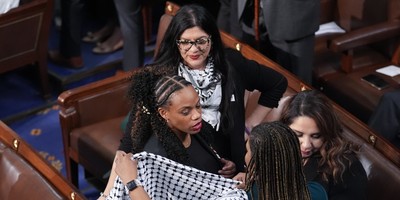Conservatives have enjoyed judicial victories over the past couple of weeks. Harris v. Quinn saw the Supreme Court limiting the power for public sector unions to collect dues, albeit it was a very narrow ruling; as was the Hobby Lobby decision that granted religious exemptions to “closely-held corporations.”
Yet, another case could put the entire health care law back in the crosshairs. It’s still yet to be decided by the D.C. Court Of Appeals, but Halbig v. Burwell (formerly Sebelius) could place Obamacare’s constitutional fate back in the hands of the Supreme Court.
The issue deals with federal subsidies being given to individuals to help them buy insurance on an exchange (via Jonathan Turley):
The Halbig case challenges the massive federal subsidies in the form of tax credits made available to people with financial need who enroll in the program. In crafting the act, Congress created incentives for states to set up health insurance exchanges and disincentives for them to opt out. The law, for example, made the subsidies available only to those enrolled in insurance plans through exchanges "established by the state."
But despite that carrot — and to the great surprise of the administration — some 34 states opted not to establish their own exchanges, leaving it to the federal government to do so. This left the White House with a dilemma: If only those enrollees in states that created exchanges were eligible for subsidies, a huge pool of people would be unable to afford coverage, and the entire program would be in danger of collapse.
Indeed, the Halbig plaintiffs — individuals and small businesses in six states that didn't establish state exchanges — objected that, without the tax credits, they could have claimed exemption from the individual mandate penalty because they would be deemed unable to pay for the coverage. If the courts agree with them, the costs would go up in all 34 states that didn't establish state exchanges, and the resulting exemptions could lead to a mass exodus from Obamacare.
Recommended
Philip Klein at the Washington Examiner, who was present for oral arguments on the three-judge panel last March, noted that two judges’ decisions rested on partisan lines. Judge Harry Edwards, a Carter appointee, thought the challenge was disingenuous and a way to “gut” the law. Whereas Judge Raymond Randolph, an appointee of George H.W. Bush, said the Obama administration’s argument that Congress meant “established by the state” to mean the federal government was a “leap.” Moreover, Judge Randolph shot down the “isolated phrase” angle the administration tried to take, noting that the phrase “established by the state” was used several times in the section in question.
The swing vote is Judge Thomas Griffith, a George W. Bush appointee that Obama voted to confirm in 2005. Klein said he asked questions that were critical of both sides arguing the case.
Jonathan Turley, a George Washington University professor, wrote in his op-ed for the Los Angeles Times cited above said that the D.C. Court of Appeals could view this case differently given the string of cases where the courts have checked Obama’s power. NLRB v. Canning is a notable example where the Supreme Court unanimously ruled that the president’s recess appointments to the National Labor Relations Board were unconstitutional in 2012.
So, what’s are the consequences if this decision ends up being another blow to the Obama administration? Klein wrote on June 24:
If the court rules against the Obama administration and the ruling stands, it would mean that individuals in states that defaulted to a federal exchange would no longer be eligible for subsidies. And in total, exchanges in 36 states were created at least in part through the federal government.
So, states opposed to Obamacare could simply refuse to set up a state exchange or to expand Medicaid. In those states, employers wouldn't be penalized for failing to offer qualifying insurance (which is triggered by workers seeking federal subsidies), meaning that anti-Obamacare states could become more attractive to businesses trying to get around the employer mandate.
Conservatives and liberals might be heading for round two in the Supreme Court over Obamacare. One could hope.

























Join the conversation as a VIP Member